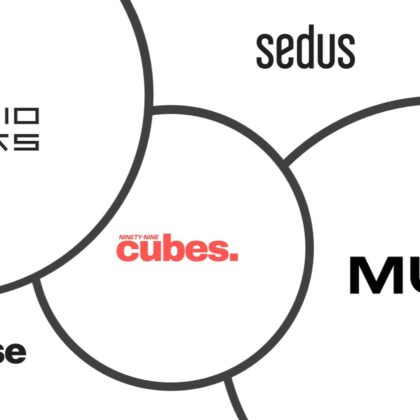Contents
- Leasing and renting acoustic cubes: similarities
- Monthly instalments - cash flow optimised
- The landlord or lessor remains the owner
- Deductible instalments as expenses
- Acoustic cubes: differences between leasing and renting
- Transfer of use or financial service?
- Leasing as a financial service is heavily regulated
- Rent is more flexible
- Credit rating
- When does it make sense to rent or lease acoustic cubes?
Leasing and renting are very common terms that everyone can relate to - after all, almost everyone has rented a flat or knows someone who has leased a car. In this article, we explain when we are talking about leasing and when it is legally correct to talk about renting, what the differences are and what you need to bear in mind when renting and leasing telephone boxes and meeting cubes.
Leasing and renting acoustic cubes: similarities
Monthly instalments - cash flow optimised
Rent or lease telephone boxes? Both options make it possible to use high-quality telephone and meeting boxes without having to make high acquisition costs, as only monthly instalments are incurred. Both renting and leasing optimise cash flow: the costs are spread over monthly instalments and liquidity is conserved.
The landlord or lessor remains the owner
As a tenant of a telephone or meeting box or as a lessee, you acquire a right of use for a certain period of time, but in both cases the legal owner remains the landlord or lessor.
Deductible instalments as expenses
From a tax perspective, the instalments resulting from a leasing or rental agreement are fully deductible as operating expenses. This is an important difference compared to purchasing (see: Purchase | Advantages and disadvantages), under which office furniture is depreciated over 13 years (regulation applies to Germany).

Acoustic cubes: differences between leasing and renting

Transfer of use or financial service?
To make a long story short: Renting is a transfer of use in which the lessor undertakes to ensure the usability of the leased object (maintenance, servicing, replacement in the event of wear and tear). Leasing, on the other hand, is a purely financial service in which the service is limited to the financial aspects and issues such as maintenance, servicing, etc. remain with the lessee.
Leasing as a financial service is heavily regulated
Leasing is regulated in two respects. In Germany it is regulated:
- Who is allowed to offer leasing at all - only providers with a corresponding licence from the Federal Financial Supervisory Authority (BaFin)
- which terms may be offered in leasing - regulated in the so-called Leasing Decree of the Federal Ministry of Finance (BMF)
Rent is more flexible
In contrast to leasing, there are hardly any restrictions on renting - virtually anyone can rent. And renting is also more flexible when it comes to organising terms.
Credit rating
As soon as leasing companies and financial service providers come into play, the creditworthiness of the hirer or lessee is of central importance. Credit agencies such as Creditreform play a major role here. Companies without sufficient creditworthiness or with too short a history (start-ups) often have no chance of being offered contracts.
The requirements are somewhat less rigid - although not independent of creditworthiness - when renting via a provider that does not act as a financial service provider but as a genuine, operational landlord, such as XOROS Home GmbH, the company behind Ninety-Nine Cubes.
Overview: Buying, renting and leasing at Ninety-Nine Cubes
| legal | fiscal | Cash flow | Runtime | |
|---|---|---|---|---|
| Purchase | Buyer becomes owner | Depreciation: amortisation over 13 years | Immediate outflow of liquidity | none |
| Leasing | The lessor remains the owner | Instalments as operating expenses | Monthly instalments | from 60 months |
| Rent | The landlord remains the owner | Instalments as operating expenses | Monthly instalments | from 24 months |
| FLEX rental | The landlord remains the owner | Instalments as operating expenses | Monthly instalments | from 1 month |
| FLEX rental with purchase option | The landlord remains the owner until a purchase option is exercised | Instalments as operating expenses | Monthly instalments | from 1 month |
When does it make sense to rent or lease acoustic cubes?
Whether or not renting or leasing in connection with the purchase of telephone and meeting boxes can play out their advantages depends very much on the individual situation of a company. The following pros and cons play a role here.
In favour of renting and leasing:
- the favourable cash flow
- improved deductibility as part of operating expenses, which is always relevant if the foreseeable useful life is shorter than the amortisation period of 13 years
- Renting and leasing are "asset-light" - so they do not tie up any capital
- for rent: Maintenance is covered by the landlord
- FLEX rental with purchase option: high flexibility with regard to the period of use, ideal for longer tests of new office concepts
Renting and leasing, on the other hand, are not recommended:
- if a long useful life can be assumed and the liquidity for a purchase is available in the company
- if subletting is planned - this is generally excluded in the case of leasing and renting
We will be happy to advise you in detail on the various options!
Questions, comments & personal advice
Are you missing any information or do you have any questions? Then please leave a comment below! You can also get free advice from us:




